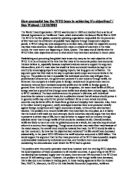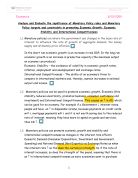The Benefits of Trade
A nation's industries, commerce, standard of living, and all other aspects of its economy are closely intertwined with the economies of foreign nations, through avenues such as goods, capital, technology and enterprise. Rising global prosperity further encourages nations to commit to harnessing relations with others in 'a world shrinking and becoming a single place.'(Marx) Not a new conception, the phenomena 'Globalisation', poses real opportunities and more surreal threats. Many contemporary authors in the field of science, politics and economics alike have resounded differing assumptions that support and contradict this newly formed sense of unity. Milton Friedman, an established economist, proclaims the ideology of a free market where 'no external force, no coercion, no violation of freedom is necessary to produce cooperation among individuals all of whom will benefit' (Friedman, p 2) In this essay, siding with the view of Friedman, I will define the key concepts of the free market and macroeconomic growth via 'the invisible hand', before critically evaluating one of its most sacred assumptions, the hypothesis that an 'invisible hand' will rid the threats of current existence and allow 'all parties to benefit.' (Friedman, p 7) Through evaluating the scope of the free market I will firstly assess the responsibility of government through intervention and secondly evaluate
Corporate Social Responsibility.
CORPORATE SOCIAL RESPONSIBILITY Globalisation of the world economy is underway, and various groups, including national governments, multinational corporations and international organisations such as the World Trade Organisation, are promoting this. However, globalisation should not be detrimental to the welfare of society. As we have moved into the global market, there is an abundant supply of labour. Capital and free trade have expanded the possibilities. Some industries e.g. textiles, have moved from country to country seeking the lowest labour costs and highest profits. Firms operating in developing countries are often criticised for failing to be socially responsible in their operations (e.g. Nike & Gap were exposed as operating factories with sweatshop conditions) and this has lead to the development of Corporate Social Responsibility. According to Certo (2002) "Corporate Social Responsibility (CSR) is the managerial obligation to take action that protects and improves both the welfare of society as a whole and the interests of the organisation". The most publicised areas in which businesses can act to protect and improve the welfare of society are: urban affairs, consumer affairs, environmental affairs and employment practice affairs. Companies are beginning to recognise that improving their impacts and addressing wider social and environmental problems will be
"To achieve both internal and external balance the authorities must use both expenditure switching and expenditure changing policies." Discuss
"To achieve both internal and external balance the authorities must use both expenditure switching and expenditure changing policies." Discuss. Internal and external balances are two of the most important economic goals or objectives for a country. (The others include a reasonable rate of growth, an equitable distribution of income and, adequate protection of the environment). Internal balance " refers to full employment or rates of unemployment no more than 4 - 5 per cent" (Salvatore). The 4 - 5 per cent allows for frictional unemployment, that is the transition period between changing jobs and allows for re-training for workers. External balance refers to equilibrium in the balance of payments - " or a desired temporary disequilibrium such as a surplus that a nation may want in order to replenish its depleted international reserves". (SALVATORE) Most nations will prioritise internal balance rather than external balance, however in certain circumstances they may be forced to switch their priorities. In particular when presented with the problem of large external imbalances. At each countries disposal are two policies to rectify any imbalances either internal or external; they are expenditure - changing policies and expenditure - switching policies. Expenditure - changing policies revolve around fiscal and monetary policies. Fiscal policy refers to changes in
To what extent were the years C1925-1929 a time of economic and political stability for the Weimar Republic?
To what extent were the years C1925-1929 a time of economic and political stability for the Weimar Republic? The years 1925-1929 were described as the Golden Years for Germany. There were no attempts to over throw the government like the Sparticist uprising or the Kapp Putsch, therefore undoubtedly it was the best years compared to the problems before and after the Golden Years. The way the golden years were perceived would indicate to what extent were the years 1925 to1929 a time of economic and political stability for the Weimar Republic. There were developments in Germany during the Golden Years in the following essay we will learn where the developments took place and whether they disadvantaged Germany or helped her regain stability. An important economic feature that had to be stable before Germany could even start sorting her other problems with the economy was the currency. A new currency had been issued in November, the Rentenmark, which came in limited quantities. Stresemann attempted at stabilising the currency disregarding the Rentenmark, as a result by the mid 1920s Germany finally has stable currency again which was the start of helping Germany regain stability. Due to the stable currency, competitive interest rates and improving status in the international community, Germany had become a main point for foreign investment. Five billion dollars was invested
"What do sociologists mean by the term 'Globalisation' and how have they tried to explain it?"
"What do sociologists mean by the term 'Globalisation' and how have they tried to explain it?" Many historians and sociologists have identified a transformation in the economic processes of the world and society in recent times. There has been an extensive increase in developments in technology and the economy as a whole in the twentieth century. Globalisation has been recognised as a new age in which the world has developed into what Giddens identifies to be a "single social system" (Anthony Giddens: 1993 'Sociology' pg 528), due to the rise of interdependence of various countries on one another, therefore affecting practically everyone within society. In this essay I will give a detailed explanation of what sociologists mean by the term 'globalisation' and how they have tried to explain it. Globalisation can be construed in many ways. Many sociologists describe it as an era in which national sovereignty is disappearing as a result of a technological revolution, causing space and time to be virtually irrelevant. It is an economic revolution, which Roland Robertson refers to in his book 'Globalisation' 1992 pg 8, as "the compression of the world and the intensification of consciousness of the world as a whole". It is argued that globalisation allows the world to become increasingly more united, with people more conscious of ethnic, societal,
What is Globalisation?
CONTENTS * Introduction to Globalisation Page 2 * Varying Levels of Globalisation Page 2 * Change in Management Structures Page 4 * Management Controls Page 5 * Transfer of Information Page 6 * Evolution of the Global Firm, Product or Geography? Page 6 * Conclusions Page 7 * References and Bibliography Page 8 * Appendices Page 9 Globalisation Globalisation is defined as "tightening international linkages on a world-wide scale". (De Wit and Meyer, 1988). As barriers to the movement of capital and tariffs are eliminated, some global organisations providing typically standardised products to world markets have in the extreme, become more powerful than nation states. (Dicken, 1998). The global firm, as opposed to the multinational firm operates with resolute consistency, at low relative costs, as if the entire world, (or major regions of it) were a single entity; in other words it sells the things in the same way everywhere1. Global Integration is leading to the promotion of international best practice through the sharing of knowledge and experience. Traditional business practices have disappeared as individual preferences have become similar, leading to the standardisation of products that, inevitably has a profound impact on organisational design. In the past there were huge inefficiencies in the flow of information around the world,
Why Was Slavery Abolished?
WHY WAS SLAVERY ABOLISHED? In 1807 the slave trade was abolished in the British Empire. This meant that no ship from Britain w as allowed to carry slaves from Africa to America. This wasn't the end of slavery though. The abolitionists like William Wilberforce, Olavdah Equiano and Thomas Clarkson were still fighting for abolition of slavery and carried on campaigning. They argued in parliament on moral, economic, religious legal and revolutionary grounds. The moral case was important. It was about the way slaves were treated etc. The English navy was stopping other boats from using the slave trade which other countries saw as unfair. They didn't see why the English could have slaves and they could not. The slave trade was cruel to the slaves. They were treated like animals and were kept very poorly on the voyage to America. When they were bought, women and children usually got split up. Thomas Phillips, an abolitionist, said "I can't think there is any basic value in one colour more than another". They had no say in what they did. They were whipped and women were often be raped. They had to work up to 16 hours in a day in summer when it was very hot. Most of them never bought their freedom and worked for all their lives. The abolitionists put forward these points and others showing how cruel slavery was. The economic case was also very important. Sugar in




















